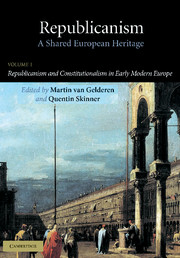Book contents
- Frontmatter
- Contents of Volume I
- Contents of Volume II
- Acknowledgments
- Introduction
- Part I The Rejection of Monarchy
- 1 ‘That a Republic is Better than a Monarchy’: Anti-monarchism in Early Modern Dutch Political Thought
- 2 Anti-monarchism in English Republicanism
- 3 Anti-monarchism in Polish Republicanism in the Seventeenth and Eighteenth Centuries
- 4 Classical Republicanism in Seventeenth-century England and the Netherlands
- Part II The Republican Citizen
- Part III The Republican Constitution
- Bibliography
- Contributors
- Index of Names of Persons
- Index of Subjects
4 - Classical Republicanism in Seventeenth-century England and the Netherlands
Published online by Cambridge University Press: 15 December 2009
- Frontmatter
- Contents of Volume I
- Contents of Volume II
- Acknowledgments
- Introduction
- Part I The Rejection of Monarchy
- 1 ‘That a Republic is Better than a Monarchy’: Anti-monarchism in Early Modern Dutch Political Thought
- 2 Anti-monarchism in English Republicanism
- 3 Anti-monarchism in Polish Republicanism in the Seventeenth and Eighteenth Centuries
- 4 Classical Republicanism in Seventeenth-century England and the Netherlands
- Part II The Republican Citizen
- Part III The Republican Constitution
- Bibliography
- Contributors
- Index of Names of Persons
- Index of Subjects
Summary
Introduction
This essay relates to a larger-scale attempted reconceptualisation of English republicanism. Its focus is upon four sets of relationships which feature in the historiography. The first two are between anti-monarchism in particular and republicanism more generally; and between republican language, constitutional form, and civic practice. What is here opposed is a reductionist tendency to collapse these relationships into one of their components. English republicanism cannot be reduced to that antimonarchical component which was a negative precondition for the achievement of positive objectives. Nor can it be reduced to a particular language or a particular constitutional vision since these things were held by most republicans to be secondary forms, adaptable in relation to an unchanging moral philosophical substance.
The other two relationships are those between seventeenth-century Dutch and English republicanism; and between the language of classical republicanism and that of natural law. Here the historiography has claimed a far more absolute separation than seems warranted by the evidence. This relates, in the case of the first, to the anachronistic modern separation of national histories. It is reinforced, in the second, by the greatest shortcoming of the existing literature on English republicanism: the relative neglect of its religious dimension. The consequent need is not simply to recover the radical Protestant republican religious agenda. It is to explain why, when classical republicanism came to England, it did so in the moral service of a religious revolution.
- Type
- Chapter
- Information
- RepublicanismA Shared European Heritage, pp. 61 - 82Publisher: Cambridge University PressPrint publication year: 2002
- 11
- Cited by



